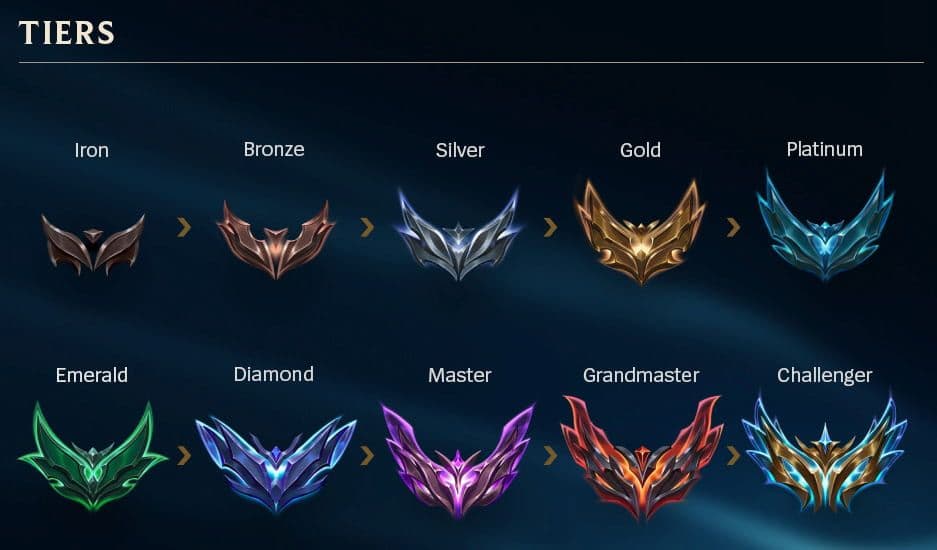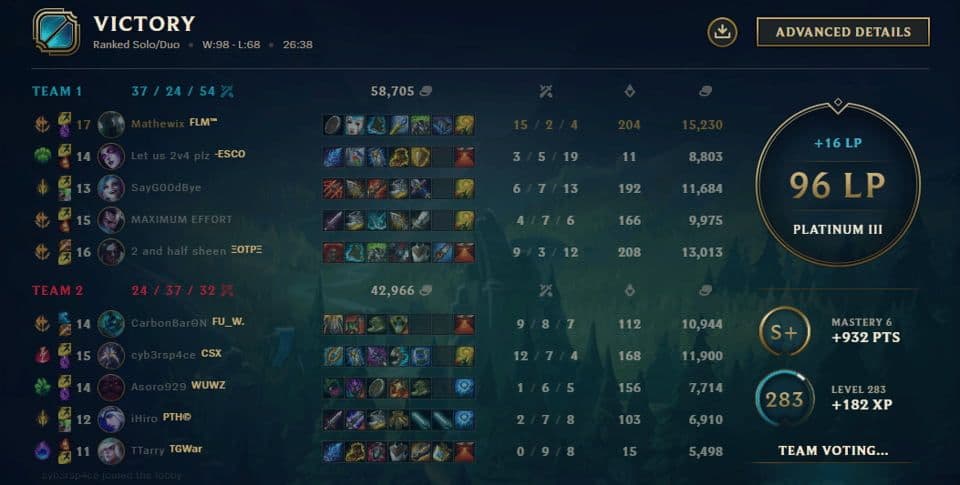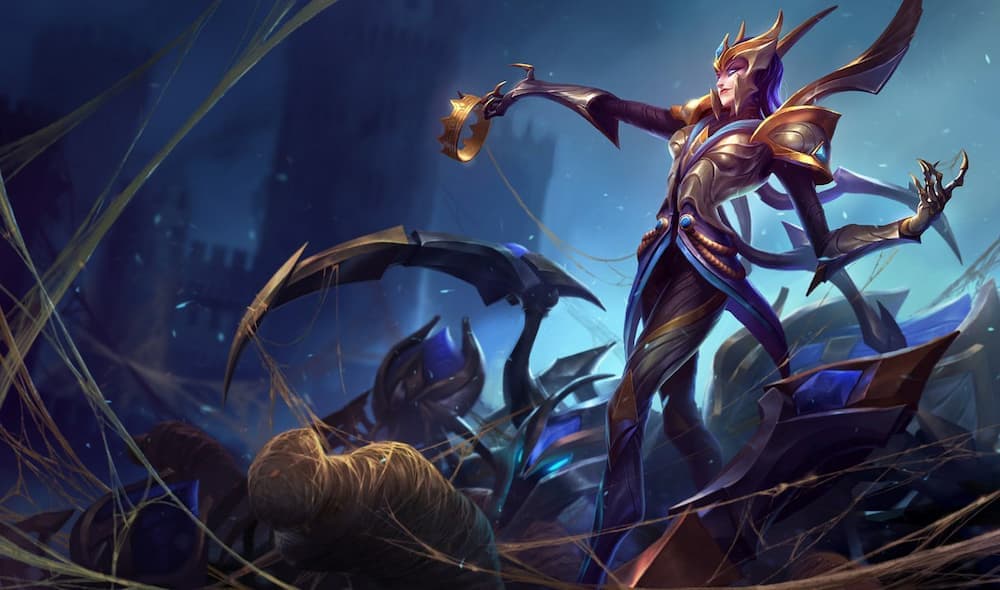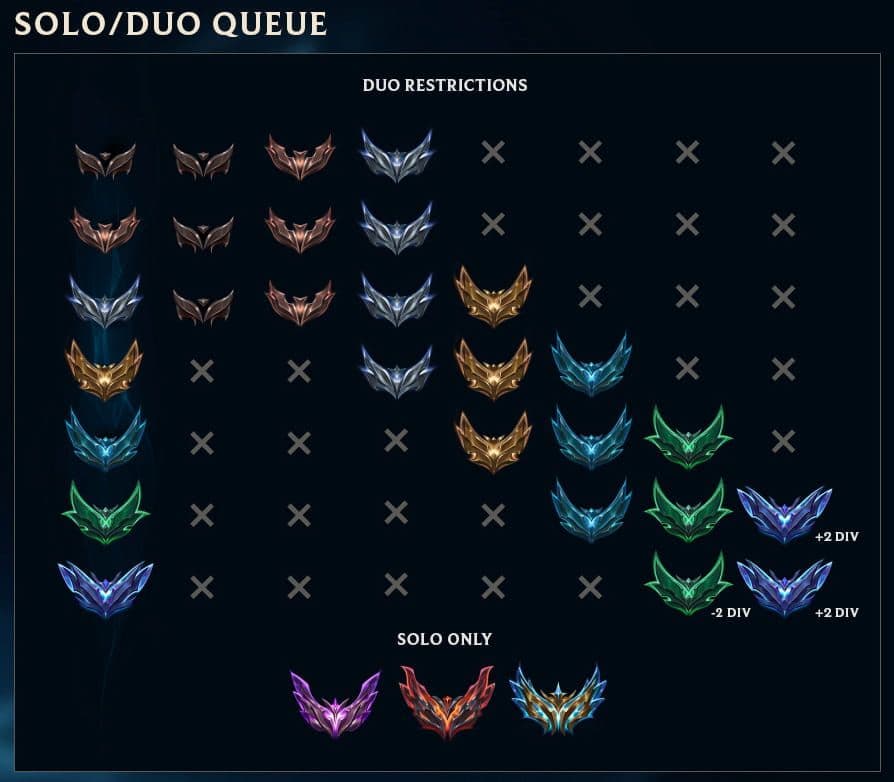Ranks
Welcome, champion. This is the beginning of your journey to the lofty heights of League of Legends’ upper ranks. Stick with us and we’ll guide you from humble Iron to god-tier Challenger.
In this guide, you’ll find everything you need to know about the ranking system in League of Legends, and how to dominate it.
Let’s carve your name in the history books…
Ranking system tutorial
Ranked games are the same as normal games, only with a competitive element. So before we dig deeper, know this… if you don’t care about playing League of Legends competitively, you don’t need to know about the game’s rank system.
But if you’re like most of us, and can’t resist the call of competition, learning how the LoL rankings tick is a vital (and exciting!) part of the experience.

LoL ranks in order
As of 2023, League of Legends gives us 10 ranks to fight for. Here’s how those ranks look in the grand scheme of things…
- Iron and Bronze – mostly made up of newbies who are still finding their feet with LoL.
- Silver and Gold – most players fall within these ranks, so they’re considered the “average” ranks.
- Platinum, Emerald, and Diamond – players at this rank have a solid grasp of advanced gameplay and strategy, and have likely put a lot of hours into LoL. Platinum is considered a very respectable rank.
- Master, Grandmaster, and Challenger – the crème de la crème, only the most skilled, knowledgable, and savvy players make it to these elite, limited-space ranks.
If you’re looking to get more granular, here’s an idea of how the player base is generally distributed across the League of Legends ranks…
Note: These percentages are just a rough snapshot. Once upon a time, they were accurate, but exact distribution changes faster than you can blink.
If you’ve an eye for becoming the next esports LoL superstar and being headhunted for your favorite team, you’ll need to pull out all the stops to join the 0.55% of players in those top 3 ranks.
Also keep in mind that player distribution can and does vary between regions. Places like Korea, for example, have a disproportionately large percentage of players in those higher ranks.

LP and MMR
To climb the LoL ranking system, you need to compete in Ranked games. The better you play, the quicker you can increase your rank.
For every Ranked game you play, you’ll earn or lose LP (League Points). Those points are how you increase your rank. A bunch of factors influence how many points you gain or lose, including the rank and MMR of your opponents and teammates, and how well you played.
MMR is the Matchmaking Rating. It’s a hidden score that affects your progress through the ranking system and makes sure you play against people of a similar skill level to you.
- Beat players with a higher MMR than you, and you’ll receive more LP per win.
- Beat players with a lower MMR than you, and you’ll receive less LP per win.
- Lose to players with a lower MMR than you, and you’ll lose more LP.
See how that works?
If your MMR is higher than the average of those you’re competing against, or if you consistently crush opponents with a higher MMR, you’ll rake in beaucoup de LP.
Think of it as LoL’s way of bumping you up to the most suitable competitive level so you play against people who are a match for your awesomeness.

Promotion and demotion
What goes up can also come down. Yes, your rank can increase and decrease.
Within each ranking tier from Iron to Diamond, there are four divisions – IV being the lowest, and I being the highest. To increase your rank in League of Legends, you must climb through all four divisions within that rank.
To move up a division, you need to earn 100 LP. Once you’ve earned the LP, you’ll advance to the next division/rank tier.
Be warned though, if your LP drops to zero during your Ranked games, you’ll be at risk of demotion. A yellow icon will appear on your ranked profile to indicate this risk, but you usually have a few games before being demoted, even when your LP hits zero.
When one more loss will demote you, the yellow icon will turn red.
If you are demoted, you’ll drop to the previous tier/division (e.g. Silver IV would be demoted to Bronze I), with 75 LP to your name.
Players hoping to reach Grandmaster rank will need to earn 200 LP and gain more LP than the lowest-scoring Grandmaster player in their region.
And those aiming for Challenger will need a Herculean 500 LP as well as more LP than the lowest-scoring Challenger in their region. Good luck, Chuck!

Climbing the ranks
If you want to avoid demotion and advance through the LoL ranks like a boss, you’ll need to kick ass consistently.
Winning more games than you lose is as important as heat in hot sauce. The odd win mixed in with a bunch of losses isn’t going to get you anywhere fast. Consistent wins will also give you a buffer against the occasional loss, and help you keep up an overall upward trend in the LP you earn.
The best way to guarantee consistently solid performance and bag those regular wins is…
- Build your knowledge of the game’s mechanics.
- Study the strategies of the best LoL players.
- Learn the maps so well you start dreaming of them.
- Figure out which of League of Legends’ champions suit your playstyle, and learn how to play them best.
- Master the art of team communication.
Climbing the ranks is a journey. It’s going to take time, effort, and a giant boatload of patience.
It’s also not linear – meaning yes, you can skip entire divisions and ranks within the LoL ranking system if you’re on an especially badass hot streak 🔥
ELO ELO?
You may hear players talk about their ELO in League of Legends and wonder what the heck they’re babbling about.
ELO is a rating system created by a physics professor in 1960 to classify chess players. Lots of competitive online multiplayer games have adopted it for their own player ratings. It’s just another number to rate your skill level - the higher your ELO, the more competitive you are.
Thing is, ELO is the ranking system that Riot used to use for League of Legends before 2013. Nowadays, it’s all about the MMR and LP.
So if you hear anyone chatting about their ELO, chances are they’re a legacy player from the earlier days of LoL. Don’t stress over it, they’re just talking about their rank. Since Riot never mention ELO on their League of Legends pages, it’s fair to say it’s no longer a factor.
If you’re asked what ELO you are, respond with your rank.

Ranked queues
Ranked play in League of Legends is split into two different queues – Solo/Duo, and Flex. Each queue has its own restrictions and ranking.
Players in the Solo/Duo (aka SoloQ) are grouped with no more than one other person. It’s a queue designed to test everything from your skills and game sense to your communication and teamwork. It’s also where your rank is entirely your own.
In Solo/Duo, you’ll also only come up against players of a close enough tier to you to be competitive. The image above shows it best, but here’s an example…
A newbie player at Iron rank can compete against other players of Iron rank, and those in Bronze and even Silver ranks. Once a player reaches Gold rank though, they’ll only be competing with players in Silver, Gold, or Platinum ranks.
Reach Diamond rank, and your competition will be much closer to you – only 2 divisions will separate you from any opponents now.
If you hit the heroic ranks of Master, Grandmaster, or (dare we dream it) Challenger, you’ll have to use the Flex queue.
The Flex queue (FlexQ) keeps things simple…
For players ranked Diamond and below, there are no restrictions on who you can team up with or face. The only rank-based restrictions are for players at the top of the food chain – those ranked Master, Grandmaster, and Challenger will only ever compete against players of Emerald rank or higher.

The lack of restrictions can make things tough in Flex, especially if Iron-ranked players queue with Diamond players, so be wary!
The only other restriction in FlexQ is party size. You can queue in groups of 1, 2, 3, or 5, but not 4. This is to improve teamwork and avoid scenarios where single players are competing.
Your ranking in Flex is team-based, not individual. If you try to lone-wolf your games in Flex, you won’t be rewarded, and could actually negatively affect your ranking.
Placement games
Before you get your first rank in LoL, you’ll have to compete in placement games. These games rate your performance and decide your starting rank, but you can’t access them until you meet two criteria…
- Reach a player level of 30 or higher.
- Own 20+ champions.
Win-loss ratio is an important factor in these games, but so is your individual performance. Even if you lose some of your placement games, you can still score a high rank if you play well regardless.
That said, winning all of your placement games can boost your ranking significantly.
Rank decay
You don’t generally have to worry about this until you reach Diamond IV or higher, but League of Legends does operate a rank decay system. It’s designed to incentivize the best players to remain active and involved in Ranked games, rather than getting complacent.
Rank decay begins if a Diamond IV or higher-ranked player doesn’t compete in Ranked games for a set number of days. For players in Diamond rank, it’s 28 days. For those in the Apex tiers (Master, Grandmaster, and Challenger), it’s 10 days.
A player under rank decay will regularly lose LP until they compete again (50 LP per day for Diamond tiers, and 75 per day for Apex tiers).
It’s rank decay that makes sure only the current best of the best hold the top rankings in League of Legends.
To stop rank decay affecting you, make sure you play at least one Ranked game every seven days.

Dodging, AFK, and /Remake
Losing a teammate during a match to AFK is AAF (annoying as f***).
Going AFK puts your whole team at a major disadvantage, which is why Riot punishes those who intentionally abandon games early with queue delays of varying severity depending on how often they commit this grievous LoL sin.
Thankfully, they also offer an escape route for such screwed-over teams…
If you type /Remake 3 minutes into a game where a teammate has gone AFK, you can exit the game without any penalties to your LP or MMR. Thanks, Riot!
Players who dodge ranked games will also lose LP.
Season splits
Every year, League of Legends has a new Season. Within that Season are two splits, usually in January and another roughly halfway through the year.
Within those Seasons, you’ll be able to earn bonus rewards for your Ranked performances.
At each split, you become unranked again, and will have to play ten placement games to re-establish your rank for the new Season split. This usually leaves you around a full tier below your previous rank.
The highest rank you can start a new split from is Platinum I. Everyone will have to battle it out for anything higher than that.
Changes to the ranking system
Riot regularly updates the ranking system for League of Legends. 2023 saw plenty, including the addition of the Emerald tier and a shift to only two splits per Season, instead of three.
If you’re serious about competing in LoL’s Ranked gameplay and have a mind to dominate the competition, keep your eyes and ears peeled for any announcement from Riot about changes to the ranking system.
Is 4 or 1 higher in League?
League of Legends ranks go from Iron to Challenger. Each rank below Master has four divisions: IV, III, II, and I. Division IV is the lowest and Division I is the highest within each rank. For example, Gold I is higher than Gold IV. If you want to move to the next rank, you need to climb from Division IV to I first. The game rewards consistent wins and good performance. Losing many games can push you back to a lower division.
Why level 30 for ranked?
Ranked mode in League of Legends unlocks at level 30. This rule helps make sure players have enough game experience before entering competitive matches. Players also need to own at least 20 champions.
